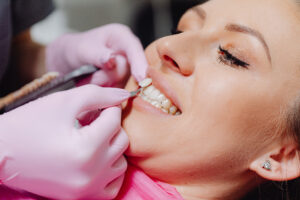 Veneers are proven to provide long-lasting results with the proper care. On average, they last for 10 years or longer before needing to be replaced. It isn’t entirely unheard of for a veneer to fall off. Whether you just got your veneers, or you’ve had them for many years, don’t panic if one falls off. Here’s what you should do until you see your emergency dentist.
Veneers are proven to provide long-lasting results with the proper care. On average, they last for 10 years or longer before needing to be replaced. It isn’t entirely unheard of for a veneer to fall off. Whether you just got your veneers, or you’ve had them for many years, don’t panic if one falls off. Here’s what you should do until you see your emergency dentist.
Reasons Why Veneers Fall Off
It’s common for veneers to last for over a decade with the right care, like brushing and flossing. However, a veneer can lose its bond with your tooth, which may occur for various reasons, including:
- It’s Older: The bonding material can weaken with age, especially as time passes. Eventually, your veneer can fall off.
- Poor Application: If your tooth wasn’t prepared correctly or there was an error during the bonding process, you can experience veneer failure.
- Improper Fit: A veneer must fit your tooth like a glove. The smallest of errors during the impression or fabrication process can cause your veneer to fit incorrectly, which may result in it popping off.
- Tooth Decay: Veneers can’t get cavities, but your underlying tooth is still vulnerable to decay. Cavity-causing bacteria can gain access to your tooth through cracks that form in the dental cement over time.
- Bad Habits: Chewing on inedible objects, biting your fingernails, or using your teeth like scissors can damage your veneers.
Handling a Lost Veneer
If your veneer falls off, don’t panic. Here’s what you should do at home until your dental appointment:
- Find the Pieces: Pick up the pieces and place them in a storage container with a lid. If your veneer isn’t damaged, your dentist may be able to bond it to your tooth.
- Contact Your Dentist: Contact your emergency dentist for an appointment. Do not delay treatment because your tooth will be vulnerable to sensitivity, decay, and damage without the protection of a restoration.
- Manage Pain: Take an OTC pain reliever if you have any discomfort. Avoid any hot or cold foods and drinks to prevent sensitivity.
- Eat Carefully: Eat soft foods that require minimal chewing. Chew on the opposite side of your mouth, if possible.
- Keep Your Mouth Clean: Commit to brushing your teeth after every meal to remove plaque and food residue. Don’t forget to floss your teeth every day. Rinse your mouth with salt water to reduce pain and inflammation. It will also kill any harmful bacteria.
Your emergency dentist will get you into the office quickly. They’ll determine if your veneer is salvageable or if you need a replacement.
About Dr. Jeremy Goodman
Dr. Goodman achieved his dental degree at the University of Maryland School of Dentistry and has completed a residency in Advanced General Dentistry. He regularly continues his education to provide the most advanced solutions in dentistry, including cosmetic dentistry. Request an appointment through his website or call his office at (410) 849-6247.

